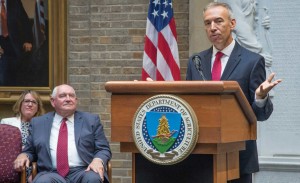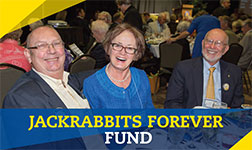At one time in his life, Steve Censky ’83 was planning to teach agriculture to high school students. In fact, he was set to return to South Dakota State in fall 1983 and student teach that upcoming semester. However, those plans were interrupted when Sen. Jim Abdnor called the university looking for a legislative assistant to handle agriculture issues and interact with the state’s agriculture leaders.
Del Dearborn, then dean of the College of Agriculture and Biological Sciences, recommended Censky, who had an interest in politics and public policy. Censky, who had served as the Students’ Association vice president, interviewed for the position and was offered the job. Little did the Jackson, Minnesota, native know then he’d be returning to Washington, D.C., more than 30 years later for another round of interviews when nominated to be the deputy secretary for the U.S. Department of Agriculture.
After working for Abdnor, Censky worked at the USDA in both the Ronald Reagan and George H. W. Bush administrations, served as administrator of the Foreign Agricultural Service and was named CEO of the American Soybean Association, a position he held since 1996.
Sonny Perdue, the USDA secretary, asked Censky in March if he would consider serving in that role. The formal nomination came in July. Censky said the next months were a whirlwind of interviews.
“There were extensive FBI background checks, numerous security clearances, having to remember every country I’ve visited since the age of 18 and explaining why, financial disclosure forms to be completed … ,†he said. “My nomination had not yet been announced publicly, so my neighbors began to get suspicious that something was up when an FBI agent showed up in our neighborhood and started asking questions about me.
“Then came the formal nomination and preparations for the Senate confirmation hearings in September,†Censky continued. “I was hopeful about the confirmation and expected I’d have strong support from the Senate Agriculture Committee based on my career working for the interests of farmers and ranchers, but I was prepared for the worst, too. The confirmation hearing itself was fun; you’re able to tell a little about your life story and what you hope to accomplish if you’re confirmed.â€
That confirmation came Oct. 3 and Perdue swore Censky in as deputy secretary Oct. 10.
In addition to having a role that he called “serving as the USDA’s chief operating officer,†Censky’s goals are:
diversify market opportunities for farmers, not only through trade agreements but also through local and regional markets;
use USDA resources to help farmers and ranchers prepare for and adapt to changes in weather and climate; and
close the digital divide between rural America
and urban America by bringing broadband to rural towns and farm families.
“Changes in weather and climate bring new disease cycles and pressures on crops—things we have a responsibility to address,†he said. “USDA needs to think ahead 20, 50, 70 years and make sure we are taking action to prepare for that.â€
Part of his work also will be the upcoming farm bill. His experience growing up on a farm plus his work on previous farm bills all provide insights on the bill’s impact.
“USDA’s responsibility is to play more of a supporting role at this point; help Congress with the analysis and implications of policy options,†Censky said. “Once it’s passed, our job will be to develop rules and regulations as quickly as possible to implement the law and deliver the programs.â€
-Matt Schmidt






